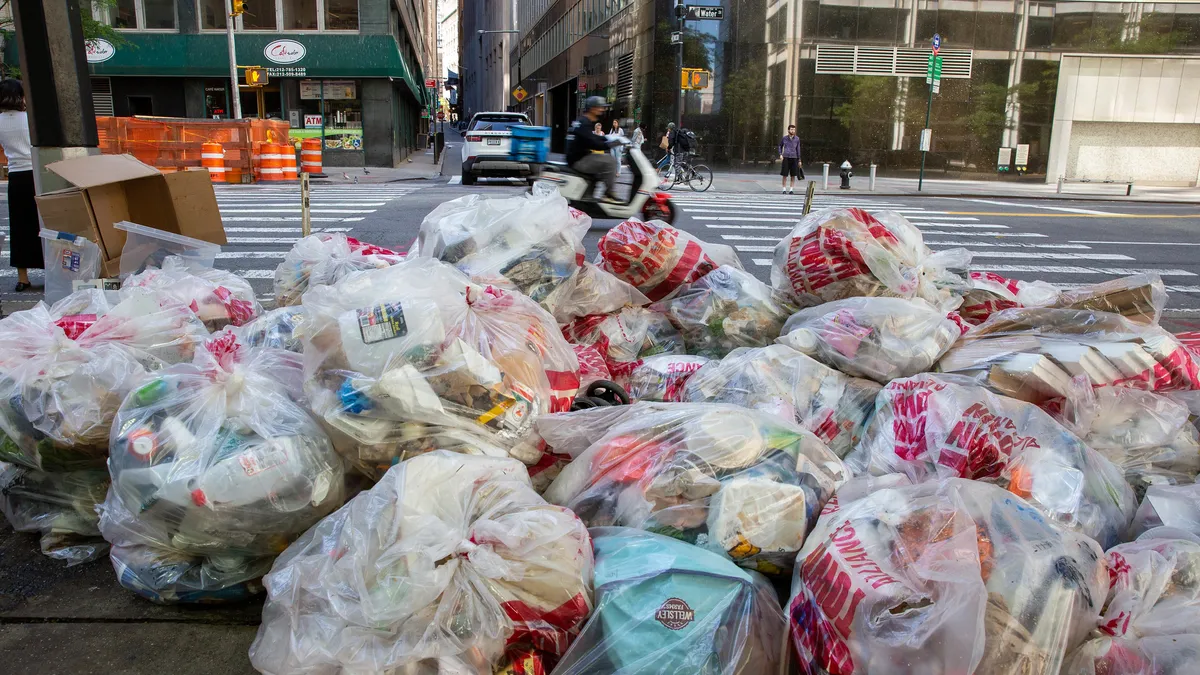Beyond Plastics and dozens of other environmental groups recently signed a memorandum of support backing the New York Packaging Reduction and Recycling Infrastructure Act, state legislation that includes extended producer responsibility for packaging. A New York packaging EPR bill did not pass last year.
The groups highlighted that key aspects of the bill include that companies with net annual income over $1 million would have to cut plastic packaging in half over 12 years. The bill also seeks to prohibit many toxic chemicals in packaging and block chemical recycling from being considered recycling.
The Senate bill (S4246A) is sponsored by state Sen. Pete Harckham and the Assembly bill (A5322A) is sponsored by Assemblymember Deborah Glick.
“I think this bill is not only the most important environmental bill of the session, I think it's the most important environmental bill of the decade,” said Judith Enck, president of Beyond Plastics and a former EPA regional administrator, during a virtual press conference Thursday.
Bill supporters highlighted that Mayor Eric Adams’ New York City preliminary $109.4 billion budget for fiscal year 2025, released this week, notes a $477 million annual cost to export waste, including to landfills in the Finger Lakes and to an incinerator in Newark, New Jersey.
Council Member Sandy Nurse, former sanitation committee chair, described this as an environmental issue.
“This is also a major economic issue for our city. While New York City faces major budget cuts, we're still being forced to spend nearly a half a billion to export our garbage, much of which is still made up of single use plastic,” she said.
Supporters touted potential revenue generation if the bill is enacted, anticipating New York City would receive at least $150 million to support recycling and waste disposal costs via packaging fees paid by producers.
New York Gov. Kathy Hochul’s $233 billion budget proposal this week did not include an EPR for packaging proposal, despite support in previous years.
Harckham said Thursday that by the time the EPR bill passed out of committee last year it was late in the session. Last-minute updates had included allowing for the definition of recycling to be adjusted every three years, in response to industry criticisms about chemical recycling being left out. The bill also would have established a single producer responsibility organization in the program’s inaugural decade and implemented a five-year “look-back period” on packaging reduction requirements to account for companies’ recent progress.
As 2024 gets underway, “It's been a long time in coming and we are committed to really working hard and making this our No. 1 priority to get through this year,” Harckham said.
Among the list of supporters are reuse service operators DeliverZero, Dispatch Goods and Re:Dish. Ryan Merola, deputy commissioner for New York City’s Department of Sanitation testified in support of the bill in October on behalf of the city and DSNY, before the Senate and Assembly committees on environmental conservation.
The American Chemistry Council is also engaged on the bill, but wants to see it include provisions for chemical recycling, as reported by WAMC.
Four U.S. states — California, Colorado, Maine and Oregon — have passed EPR for packaging laws. In the year ahead, packaging stakeholders expect to see EPR bills and discussions resurface in numerous statehouses, with more potentially being inspired by approaches in Maryland and Illinois last year to initiate study bills or needs assessments prior to adopting an entire EPR program.
Interested in more packaging news? Sign up for Packaging Dive’s newsletter today.















